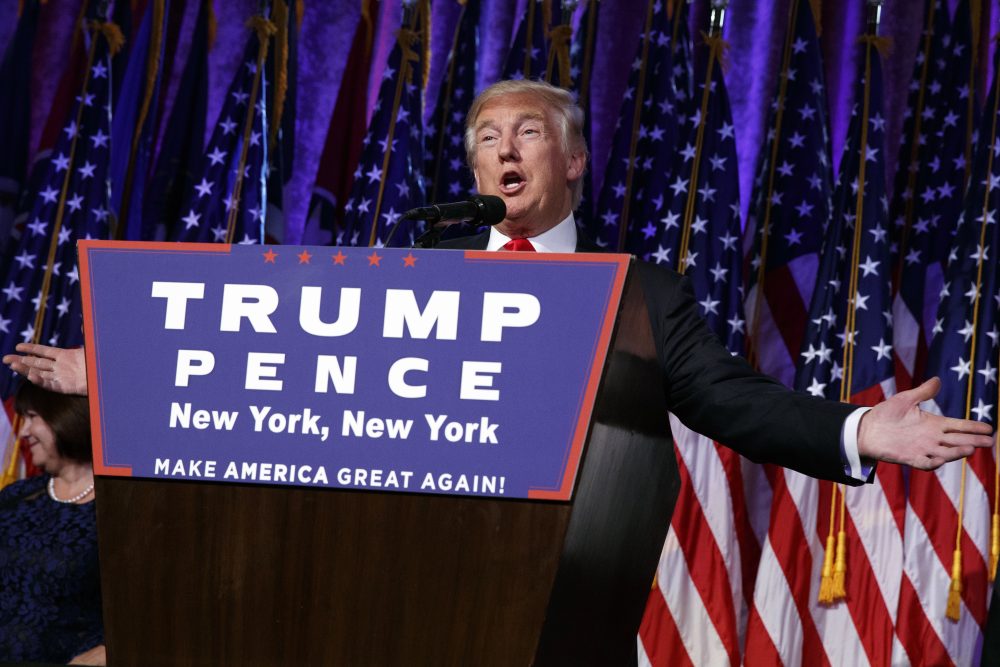Advertisement
Child Psychiatrists: If Kids Are Feeling Anxious After Election, How To Help

Elections are, above all, political moments, but each one offers parenting moments as well. That's certainly the case with this one. One Boston-area mother told me Wednesday morning: "My son has been very worried about Donald Trump, who he calls 'the bully.' I've been telling him not to worry. The bully wouldn't win."
What could she tell him now? For about half the country, Trump's victory was cause for celebration, but for many in the other half, it was a source of shock and trepidation — including for many young people, to the point that Boston school administrators offered post-election counseling and support.
Dr. Gene Beresin, director of the Clay Center for Young Healthy Minds at Massachusetts General Hospital, says a colleague texted him that her 5-year-old daughter "woke up petrified" Wednesday because she was convinced — apparently by kids at school — that Trump would make her leave the country because she has brown skin.
How to respond? Beresin and Dr. Steve Schlozman, the Clay Center's associate director, begin with reassurance: "This is not the 'Hunger Games,' " Schlozman has been telling his teen patients in recent weeks, in sessions that he says sometimes sounded a bit like civics class. Dystopian apocalyptic stories are fun to read and watch, he's been telling them, but they're not helpful in the real world.
"So I help kids remember the sun will come up," he says (and he was using that phrase even before President Obama did.) "People will go to school, there will be jobs," he says. He has also been talking about checks and balances, and the limits to presidential power.
For younger children, the message may be as simple as "reminding them that things are going to be OK," Schlozman says. "Often, that's all younger kids need to know."
He adds:
Remember that kids get more from the furrows in your brow than they do from the words that come out of your mouth. That means that you reassure them, but don't feel that you can't show them your emotions around this election. If you're bummed out, you can tell them that. And, if you're not disappointed, by all means let them know that you're glad about the results.
The great thing about our system -- and you can tell kids this because they'll understand, is that in an election -- someone wins and someone loses, and it's that decision that allows us to get things done. We can be happy or sad about who wins or loses, but we don't do our kids any favors if we act like their world is going to change overnight. Remember: Their world already does change overnight — every night. They have enough change to deal with just by growing up.
If they see that you look worried, and if they look concerned, you can say something like "You're right. I am a little worried, but these are adult worries. We're fine and I promise to tell you if that changes." Then, always remember to follow that up with, "Do you have any questions you want to ask me?" This is a chance to model civility and empathy and connectedness. That's as good a lesson for life as any.
And what about children who may feel particular fear because they belong to categories targeted by Trump's campaign rhetoric — Muslims, Mexicans? Beresin suggests explaining that many people, even prominent people like Trump, are afraid of people who are different from them. They do not understand that when you're afraid of someone who's different, he says, "It really means that you need to get to know them, and to understand that we are all different."
Jennifer Tsappis, a psychiatric social worker on Boston's North Shore who specializes in kids, agrees that this may be a moment to emphasize empathy and explain why some may lack it. In a blog post titled "Helping Your Child Cope With Post-Election Worry And Anxiety," she writes:
• Explain that it can help to focus on good thoughts and get more people involved in things that have a positive effect.
• Talk about ways to help, take action or advocate for issues that are important to them. Encourage volunteering, advocacy and standing up for yourself and others who are hurt.
Postscript: I asked parents on the school Facebook page in my heavily Democratic town what they were telling their kids today. One shared an educator's blog post, titled "What Should We Tell The Children?" Another, Miranda Daniloff Mancusi, wrote in part:
The fact that we can change government in a relatively peaceful way is still part of why we love this country. There are going to be a lot of anxious adults and a lot of anxiety because we don't know how this will play out. So we all have to decide, each one of us, how we will respond to our worries. Some people need to talk. Some people will want to take action. Think about the actions, even if they are small ones, that express your values — whether it is saying hello to the shy kid in the lunch room or helping at the food pantry. Many Trump supporters are good people who want change and things to get better, and those are the ones we need to work with and find common ground with. If you need extra hugs or need to talk, Daddy and I are always here.
